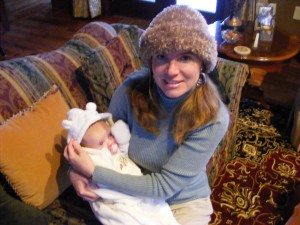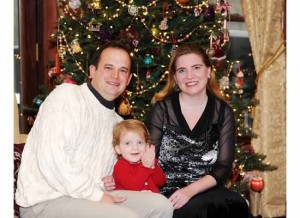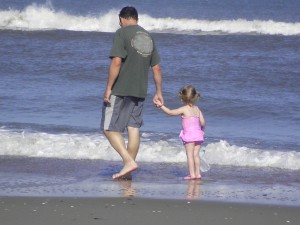The Case for Honesty: When It’s Time to Stop Keeping Up with the Joneses
I wouldn’t say I needed to read Robbins’ column that night. My days and nights of soul searching were long passed. In fact, they had passed a good six months before I even asked my husband for a divorce. But her essay verified for me what few people, particularly unhappily married ones, are willing to acknowledge—that holding a doomed relationship together for the sake of the kids is…well…perhaps among the worst things you could do to your children.
I wasn’t having any cold feet, mind you. But sometimes it helps to know you’re not a lone wolf in the wilderness. In her column, Robbins talks about a close friend who decided to leave her marriage of 23 years. The friend’s announcement came as a shock. As Robbins points out, the couple had highly successful careers, three children, a beautiful home, took fantastic vacations together, and had lots of money. Their life was perfect…or, as is so often the case, it appeared so.
Robbins notes of her friend, “Inside, Lisa felt miserable. She and her husband had become roommates—they hadn’t touched one another in years. She laughed less and less. She gained 30 pounds.” The only thing they had left in common, Robbins says, was their three children.
So the two decided to divorce, and their kids said, “Now everything makes sense.”
What struck me about “Lisa’s story” was how similar it was to my own and how similar it is to that of so many people I care about. While some might read Robbins’ essay, which encourages readers to make the hard changes that ultimately lead to joy, as a call to action, I read it as a cry for honesty.We may laugh about the old adage of “keeping up with the Joneses.” But most of us do it even as we recognize we’re doing it. The big question here is: WHY?
I’m not sure I have the answer. I’m no better than the average–I probably hung onto my marriage years longer than I should have. I recognized it was moving onto the rocks even before my daughter was born, and there’s nothing like bringing a child into the world to make a rocky coast even more treacherous. I’ll never forget our first Thanksgiving after Heidi’s birth. She was two months old, and my best friend, who was single at the time, joined us for the holiday. After we’d cleaned up dishes from the noon meal, she said to me, “I want to have a happy little family just like yours, Debbie.”
Full in the throes of postpartum depression, a newborn on my hip, my business running at full throttle, and my active duty Navy husband rarely in the picture, I was floored by her statement. I was at one of the lowest lows in my life.
I failed to notice, however, that to anyone on the outside looking in, my life looked grand. A year earlier, I had completed construction of my dream house following marriage to my high school sweetheart. My business was growing by leaps and bounds, gross income doubling every year. Things were so good, in fact, that eight months after Heidi’s birth, her dad retired from the military, and we lived secure in the fact that we could more than manage on one income. To celebrate his retirement and the newfound freedom of our lives, he and I left Heidi with the grandparents for three weeks and went on a luxurious nearly month-long vacation—a week in the Florida Keys, a week in the Caribbean, and a week lounging around on Sanibel Island. We would follow that up two years later with a trip through Northern Europe, and every October, we rented a house on the northern Outer Banks for a week in celebration of Heidi’s birthday.This was life at its very best, yes?
Hardly.
As is so often the case, what is visible on the surface is hardly indicative of what lies beneath. Behind all the smiling photographs of a perfect family life, things were not so wonderful. Today I look at professional photographs from the Christmas after Heidi turned two and am amazed at the happy expressions on my face…on my husband’s face. As I finished dressing into black velvet for the occasion, he told me he wasn’t going to participate in the photo shoot because it was a farce. And he was right. It was. He and I were no more in love at that point than a cow is happy to eat a patch of crown vetch. But I finally convinced him to play the game. The result? Falsely blissful Christmas photos for posterity.If this sounds familiar, just wait. It gets better.
When I complained, about two years after Heidi’s birth, about the wreck of my marriage to a close friend, she puzzled over what to do. She believed, the child of divorced parents herself, that maintaining the family unit was critical. After a few moments of consideration, she said, “Have you considered having an affair?”
Had it indeed come to this?
Yes, it had. And I spent the next two years of my life trying to decide if I was doing my daughter any favors by maintaining a marriage with a man I no longer loved.Because what I had to consider was whether or not it made a difference if my husband and I rarely showed affection in front of Heidi, whether or not it mattered if family dinners were typically strained and difficult, whether or not my daughter would adopt all of this lack of intimacy and tenderness between her parents as a confirmation of its “normalcy.” Did I want her to grow up and settle? To say to herself “Well, I guess this is how love is; I guess this is what marriage looks like.”
Was it going to benefit my daughter for me to “fake it” with her dad for the next 12 to 15 years?
I ultimately decided the answer to that question was a resounding “no.”
I had decided that the best things I could give my daughter were my honesty and my happiness. And if I gave her those two things, it would likely also increase my chances of finding love that was real…because I was about to be real, to stop the charade of the perfect life I’d been carrying on, well, since early adulthood at least.
And what does real love look like? Well, as a friend of mine said recently, “Real love sure as hell isn’t something you can clock in or clock out of.”
Yet that’s exactly what my ex and I had done. And it’s what thousands of other couples do every day, denying each other intimacy because it’s inconvenient, because they’re busy, because they’re hurting and don’t want to hurt anymore, because they’re afraid. So they give and receive love when it’s comfortable and deny its dispensation and acceptance when it’s not. And eventually, love is gone completely…if it ever really existed in the first place…because it has lived like a houseplant that everyone keeps forgetting to water regularly.And when a relationship reaches that point of dryness and wilt, it’s typically very hard to save.
But that doesn’t mean one has to give up and settle for a life that looks perfect but sure as hell isn’t. As “Lisa” discovered, you can always choose happiness. And you might even find yourself surprised by how that choice our culture so often deems selfish (probably because so much of the culture lives with its absence and so must justify it) changes not only you…but the people you love.
The same friend who cautioned me against the dangers of “clocking in and clocking out” on love has had no easy ride in this life, but, as Robbins noted in her essay, happiness is not always the easiest choice to make. Sometimes you have to fight for it. My friend did, and he lives by his own special creed on this one: “If I have lived my life without happiness, I have lived it in vain.”





